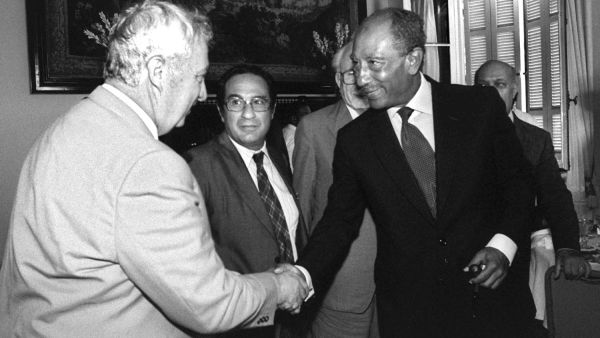I write from Egypt where the Egyptian revolution is alive, well, and broadcasting its revolutionary demands from Tahrir Square. The Egyptian revolutionaries have boldly ventured into foreign policy and, along with other political activists, have organised sit-ins and a million-man march to the Israeli embassy in Cairo. Angered by the recent Israeli killing of five Egyptian army officers in Sinai, the protesters are demanding the expulsion of the Israeli ambassador to Egypt.
Even more remarkably, the Camp David Accords, which for the last 32 years, have governed the relationship between Egypt and Israel, are being called into question. Amr Mousa, former foreign minister and Arab League chief and a leading presidential candidate, boldly stated that the Camp David Accords have expired.
Ayman Nour, a dissident and former presidential candidate during the Mubarak regime, also weighed in against the Camp David Accords, saying it was time to revisit the treaty with Israel.
Mohammad Al Baradei, former head of the UN Atomic Agency and a leading presidential candidate, went even further. He declared that if elected he would consider going to war with Israel to protect the people of Gaza. Al Baradei made that statement before the recent incident revealed the extent of popular opposition to business as usual with Israel.
Why the focus on the Camp David Accords? Because they have come to represent authoritarian decision-making divorced from the popular will. They have also come to symbolise Egyptian acquiescence in Israel’s wars against its neighbours and against the Palestinians.
Israelis and Americans have referred to the Camp David Accords as the cornerstone for regional peace and stability. The agreement has indeed provided peace and tranquillity — but for Israel — not for the region.
The Camp David Accords accomplished two major objectives for the Israeli security establishment: They ensured that in the absence of Egypt, the Arab coalition that orchestrated and waged the 1973 war with surprising results could never be reconstituted again. That threat has been neutralised.
Secondly, in freeing Israel from the worrisome threat of another Egypt-led military campaign, the Camp David Accords also freed Israel to pursue a military solution to the Palestine conflict once and for all.
Indeed, no sooner had the Israelis completed the withdrawal of their troops from the Sinai, that then Israeli prime minister Menachem Begin and his defence minister Ariel Sharon launched their army into Lebanon in June 1982. They deceptively claimed their military campaign will stop 40 kilometres inside Lebanon.
In fact their army went all the way to Beirut, laid siege to it, and set it ablaze. The frenzy of violence smashed the PLO military infrastructures, and expelled its political leadership; produced the Sabra and Shattila massacres, but in the end failed to eliminate Palestinian nationalism.
The grossly unequal confrontation between Palestinian fighters and the Israeli war machine stunned the Egyptians who watched helplessly.
Their anger at their rulers and at Camp David, which made this humiliation and punishment possible, intensified.
Egyptian opposition to Camp David took the form of sustained opposition to the so-called normalisation of relations, which Israel wanted and Egyptians opposed. Thus, freed from the oppressive rule of Mubarak, and anxious to speak their minds in defence of justice and dignity, the Egyptian revolutionaries are saying quite loudly what many have been saying from the very beginning sometimes defiantly, sometimes hesitantly: The Camp David Accords are lopsided agreements that benefited one of the parties to the conflict while leaving the other parties divided and in disarray.
Perhaps more significantly the Camp David Accords offered a dramatic illustration of a remarkably lopsided balance of power between the then president of the United States Jimmy Carter, the convener of the Camp David summit, the Prime Minister of Israel Menachem Begin; and the President of Egypt Anwar Sadat.
Begin was aware of the strategic advantages he enjoyed vis-a-vis Sadat, having an unequal network of supporters in the US and easy access to its media and lawmakers. In fact, these realities were put to use to manipulate both Sadat and even Carter himself.
Carter’s objective was to reach a comprehensive peace agreement that is based on UN Security Council Resolution formula of Israeli withdrawal from Occupied Territories occupied in the 1967 war in return for peace (land for peace).
Sadat shared that objective but was upset that his dramatic visit to occupied Jerusalem in 1977 did little to change the Israelis’ view of the Palestinians and of their entitlement to self-determination.
Sadat was also frustrated at Camp David by Begin’s intransigence and refusal to accept self-determination for the Palestinians whom he viewed as residents in the land of Israel. He was generously ready to grant them some form of autonomy, but under strict Israeli control.
When at one point Sadat threatened to leave, Carter threatened him with downgrading American-Egyptian relationship.
Begin came for the unique and incomparable advantage of getting a separate treaty with Egypt — thus removing it from the confrontation camp, without giving in to American or Egyptian demands for justice and self-determination for the Palestinians. He refused to even discuss occupied Jerusalem — to Carter’s annoyance. He refused to accept that Security Council resolution’s formula land for peace applied to the West Bank. Carter could have but chose not to exercise America’s enormous leverage on Israel.
In the end, Begin achieved his objectives and Carter and Sadat were left to try to put the best face on a decidedly lopsided agreement.
Even when negotiating the separate peace with Israel, Sadat infuriated his entourage by his one-man decision-making approach to negotiations.
When working on my book From Camp David to the Gulf (1993-96) I interviewed the principals in Sadat’s entourage for the separate peace with Israel. Egyptian Foreign Minister Esmail Fahmy resigned rather than go to Israel with Sadat. Sadat replaced him with Mohammad Ebrahim Kamel who came to Camp David, but resigned while still at Camp David, he told me, to protest the concessions Sadat was making. Boutros Boutros-Ghali, Nabeel Al Arabi, and others made it clear to me that they were aware of the shortcomings of the final accords, but disagreeing with Sadat would not have remedied the defects of the Camp David Accords. Now, they are free to speak their minds.
In the new revolutionary environment where fear is replaced by self-assertiveness, the people are speaking up. A subservient and accommodating Egypt is a thing of the past — they are saying. Israel should listen.








